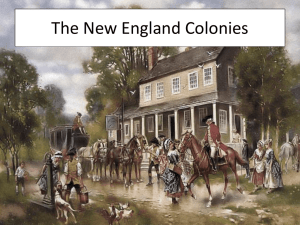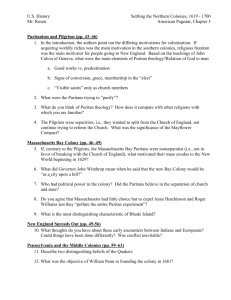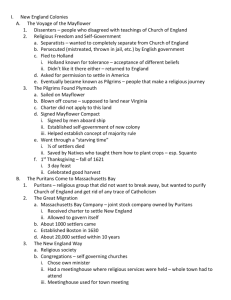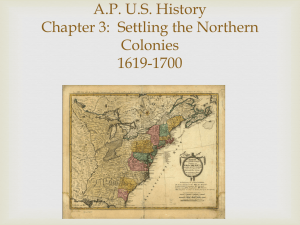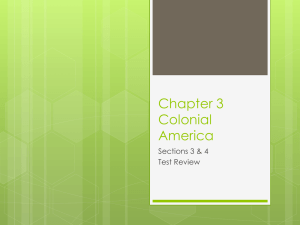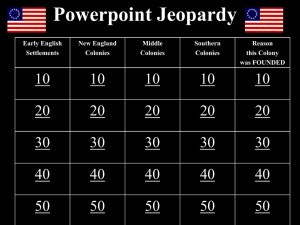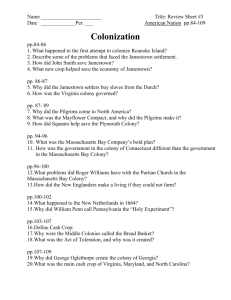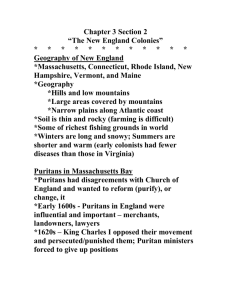US History Fort Burrows The Thirteen English Colonies 1630 to 175
advertisement
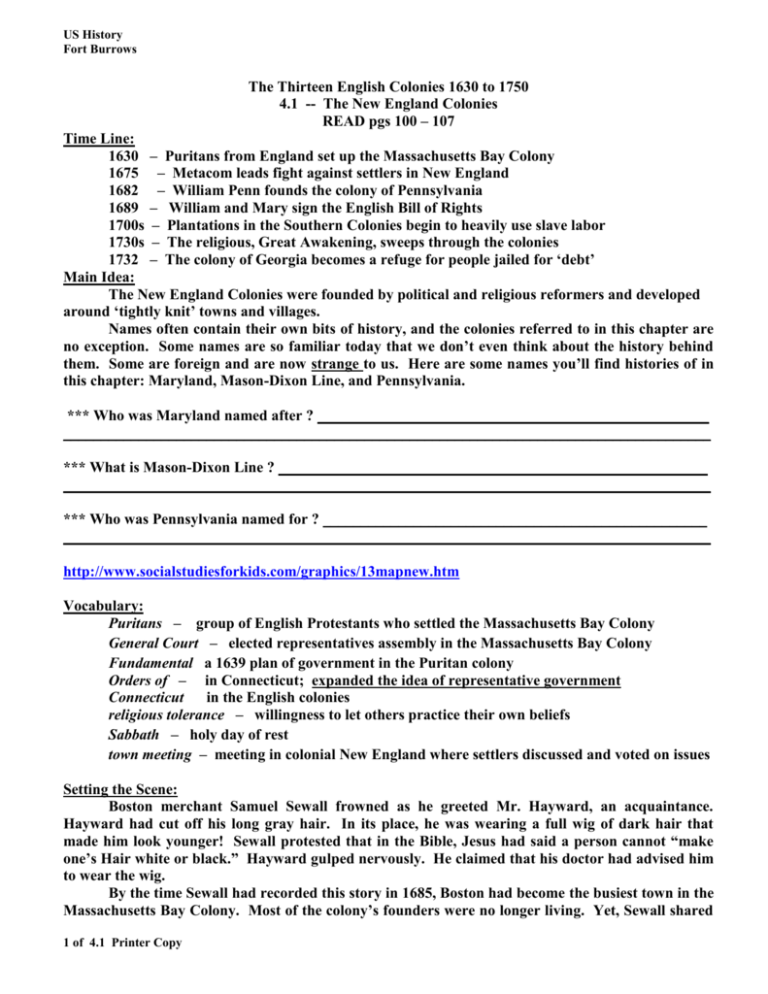
US History Fort Burrows The Thirteen English Colonies 1630 to 1750 4.1 -- The New England Colonies READ pgs 100 – 107 Time Line: 1630 – Puritans from England set up the Massachusetts Bay Colony 1675 – Metacom leads fight against settlers in New England 1682 – William Penn founds the colony of Pennsylvania 1689 – William and Mary sign the English Bill of Rights 1700s – Plantations in the Southern Colonies begin to heavily use slave labor 1730s – The religious, Great Awakening, sweeps through the colonies 1732 – The colony of Georgia becomes a refuge for people jailed for ‘debt’ Main Idea: The New England Colonies were founded by political and religious reformers and developed around ‘tightly knit’ towns and villages. Names often contain their own bits of history, and the colonies referred to in this chapter are no exception. Some names are so familiar today that we don’t even think about the history behind them. Some are foreign and are now strange to us. Here are some names you’ll find histories of in this chapter: Maryland, Mason-Dixon Line, and Pennsylvania. *** Who was Maryland named after ? ____________________________________________________ ______________________________________________________________________________________ *** What is Mason-Dixon Line ? _________________________________________________________ ______________________________________________________________________________________ *** Who was Pennsylvania named for ? ___________________________________________________ ______________________________________________________________________________________ http://www.socialstudiesforkids.com/graphics/13mapnew.htm Vocabulary: Puritans – group of English Protestants who settled the Massachusetts Bay Colony General Court – elected representatives assembly in the Massachusetts Bay Colony Fundamental a 1639 plan of government in the Puritan colony Orders of – in Connecticut; expanded the idea of representative government Connecticut in the English colonies religious tolerance – willingness to let others practice their own beliefs Sabbath – holy day of rest town meeting – meeting in colonial New England where settlers discussed and voted on issues Setting the Scene: Boston merchant Samuel Sewall frowned as he greeted Mr. Hayward, an acquaintance. Hayward had cut off his long gray hair. In its place, he was wearing a full wig of dark hair that made him look younger! Sewall protested that in the Bible, Jesus had said a person cannot “make one’s Hair white or black.” Hayward gulped nervously. He claimed that his doctor had advised him to wear the wig. By the time Sewall had recorded this story in 1685, Boston had become the busiest town in the Massachusetts Bay Colony. Most of the colony’s founders were no longer living. Yet, Sewall shared 1 of 4.1 Printer Copy US History Fort Burrows their ideals. He looked to the Bible to guide him in matters large and small - even the treatment of one’s hair. Sewall wanted his colony to be a “holy commonwealth” that followed the laws of GOD. Religion played a large part in the founding of colonies in New England. During the 1630s, thousands of English settlers came to live around Massachusetts Bay, north of Plymouth. Gradually, English settlers built towns and farms throughout the region. These settlements shared a distinctive way of life. The Puritans Leave England for MASSACHUSETTS † Migration to Massachusetts Bay led by Puritans † Wanted simpler forms of worship; do away with Catholic church practices † No special clothing for priests, no organ music; less finely decorated houses of worship ‡ Leaving England During ‘Evil Times’ † Puritans were powerful; well-educated and successful merchants/landowners † Charles I disapproved of Puritans and their ideas † He canceled Puritan business charters; jailed others † Puritans wanted grant to charter the Massachusetts Bay Company † New society based on biblical laws and teachings; set example to the world † Some settlers joined for economic (land/business) reasons versus religious reasons ‡ Governing the Colony † In 1630 – 1,000 settlers followed John Winthrop to North America † John Winthrop chosen first governor of Massachusetts Bay Company (MBC) † Discontent arose because only male stockholders in MBC could vote † Most settlers were not stockholders; resented laws due to no representation † Expanded vote to male stockholders and male church members and elected representatives to an assembly called the General Court † By 1640 – 15,000 settlers journeyed to Mass; called Great Migration; Boston grew to be colony’s largest town ¿¿ Explain the importance of the General Court in the growth of representative government. ______________________________________________________________________________________ ______________________________________________________________________________________ ______________________________________________________________________________________ Problems in Massachusetts Bay † Puritans did not like anyone to question religious beliefs or government † Discontented settlers forced to leave; some founded other colonies ‡ Thomas Hooker Founds CONNECTICUT † Hooker was a Puritan minister † In 1636, Hooker led 100 settlers to Hartford on Connecticut River † Wanted colony with strict limits on government † Wrote plan of government called Fundamental Orders of Connecticut (FOC) † FOC gave vote to all male property owners and limited governor’s power † FOC EXPANDED the idea of representative government ¿¿ Explain the role of the Fundamental Orders of Connecticut in the growth of representative government.___________________________________________________________________________ ______________________________________________________________________________________ ______________________________________________________________________________________ 2 of 4.1 Printer Copy US History Fort Burrows ‡ Roger Williams Settles RHODE ISLAND † Williams was a young minister in Salem † Believed Puritan church in Massachusetts had too much power † Believed church and state should be completely separate † Believed Puritans did not have right to force church attendance † Left Massachusetts; lived with Indians; established Rhode Island colony † Allowed religious tolerance; gave all white men the right to vote ¿¿ Compare the political reasons for the establishment of Connecticut and those for the establishment of Rhode Island. ______________________________________________________________________________________ ______________________________________________________________________________________ ______________________________________________________________________________________ NEW HAMPSHIRE 3 Points of View 1. The Province of New Hampshire was a crown colony. The charter was enacted by William and Mary, the joint monarchs of the Kingdom of England and the Kingdom of Scotland, at the same time that the Province of Massachusetts Bay was created. Both were formerly parts of the Massachusetts Bay Colony-1630. 2. Sir Ferdinando Gorges (1565–1647), the "Father of English Colonization in North America, was an early English colonial Entrepreneur and founder of the Province of Maine in 1622, although Gorges himself never set foot in the New World. In 1622, Gorges received a land patent, along with John Mason, from the Plymouth Council for New England for the Province of Maine, the original boundaries of which were between the Merrimack and Kennebec rivers. In 1629, he and Mason divided the colony, with Mason's portion south of the Piscataqua River becoming the Province of New Hampshire. 3. John Wheelwright c.1592-1679, American Puritan clergyman, founder of Exeter, N.H. http://www.encyclopedia.com/topic/John_Wheelwright.aspx#1E1-Wheelwri While pastor of a Puritan church at Mt. Wollaston (now Quincy), Mass., he alienated himself from the parent church in Boston by publicly defending the views of Anne Hutchinson , his sisterin-law. The General Court in Boston banished him from the colony in 1638, whereupon he formed a settlement at Exeter, N.H. ‡ Anne Hutchinson Speaks Out † Devout Puritan; regularly attended church; ‘ready wit and bold spirit’ † Questioned minister’s teachings and discussed with friends † Appeared before the Mass General Court † Puritans could not prove she had broken any laws/disobeyed teachings † Told General Court that God spoke to her directly † Court ordered her to leave Massachusetts so she moved to Rhode Island with family and friends † Became important symbol in struggle for religious freedom Puritans at War with Native Americans † Settlers built trading and fishing villages along coast † King made coastal settlements into a separate colony called New Hampshire † Settlements took over Native American land; fighting broke out † In 1675, Indians attacked villages in New England † Indians destroyed 12 towns; killed 600 settlers 3 of 4.1 Printer Copy US History Fort Burrows † Indian chief captured and sold with 1,000 Indians into slavery † Pattern of English expansion followed by war with Indians would be repeated OVER and OVER! Life in New England Towns and Villages ‡ Religion and Family † Took Sabbath seriously; no games, no tavern visits to drink, talk, or joke † All attended church services – LASTED ALL DAY † Men and women on separate sides of church; Blacks and Indians in balcony ‡ Government † Common – ‘center’ of village by meetinghouse for worship and meetings † Town meetings gave settlers a chance to speak their mind/discuss issues † Encouraged growth of democratic ideas in New England ‡ Economy † Rocky soil = poor farming; few crops † Forests were full of riches † Sawmill ports in Boston, MA and Portsmouth, NH; shipbuilding center † Hunted whales; whaling later grew into a big business ¿¿ How did the geography of New England influence it economic activity ? ______________________________________________________________________________________ ______________________________________________________________________________________ ______________________________________________________________________________________ ‡ Decline of the Puritans † During 1700s, Puritan tradition declined † Fewer families left England for religious reasons † Puritans ‘stamped’ New England with customs and dream of religious Society 1. Why did the Puritans decide to leave England ? ______________________________________________________________________________________ ______________________________________________________________________________________ ______________________________________________________________________________________ 2. What problems in Massachusetts colony caused people to leave ? ______________________________________________________________________________________ ______________________________________________________________________________________ ______________________________________________________________________________________ 3. Why were the Puritans and Native Americans at war ? ______________________________________________________________________________________ ______________________________________________________________________________________ ______________________________________________________________________________________ 4. Why were towns and villages important in New England life ? ______________________________________________________________________________________ ______________________________________________________________________________________ ______________________________________________________________________________________ 4 of 4.1 Printer Copy
